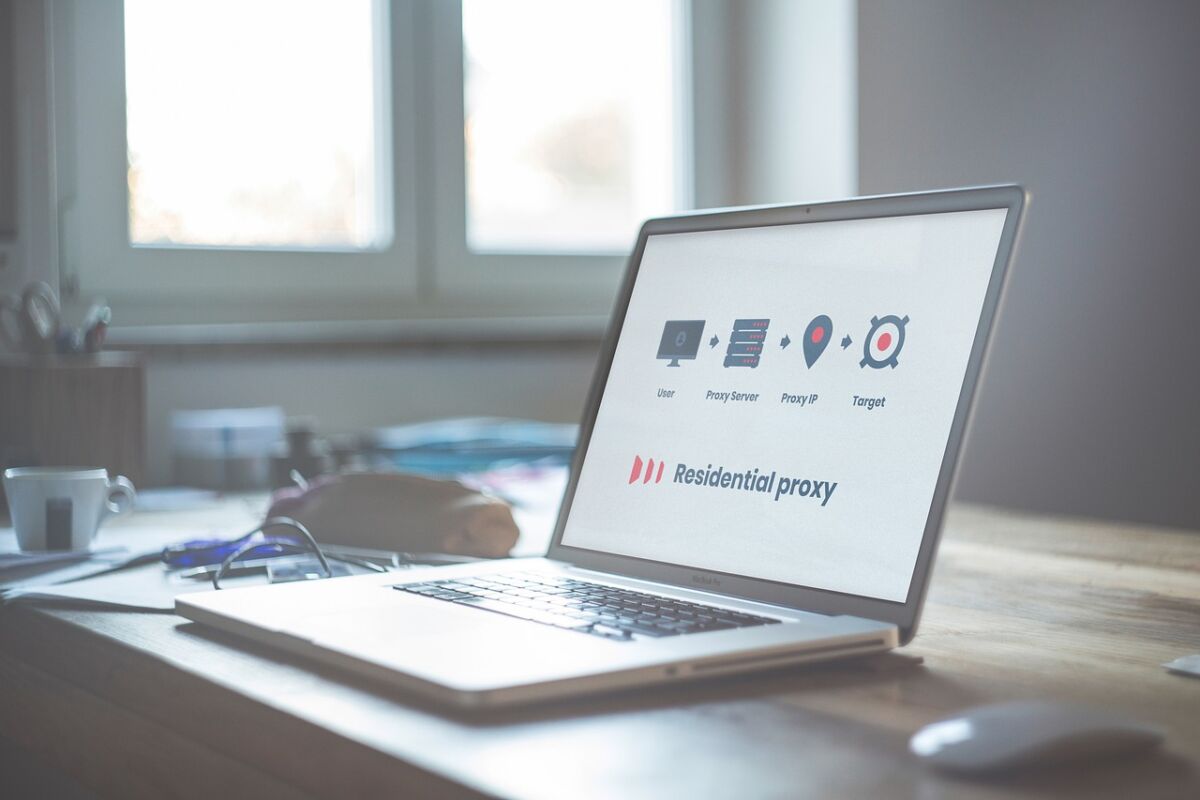To preserve your anonymity on the web, you have the option of using a VPN or using a proxy. Both are turnkey solutions to hide your real IP address and surf incognito. They provide users with a server as an intermediary between them and the Internet. Simply put, the VPN is like a relatively improved proxy, especially with the added speed and security. Decryption!
What is a proxy?
Simply put, a proxy is defined as a bridge between the Internet and the user. This tunnel will create a dummy IP address to your device. Thus, by using this tool during your navigation, the traffic will appear to come from the IP of the proxy and not yours. Be careful, this feature is not 100% reliable as we will see later in the article. Your data will not necessarily be encrypted with a proxy. Hackers can therefore easily intercept the origin of requests even in its presence.
There are three categories of proxy that you can configure on your browser:
The transparent proxy: for professionals
It is a proxy that serves as a filter. Companies and schools often use them to block access to certain sites via internal workstations. All those who connect to the network of this transparent proxy will therefore be limited in terms of Internet browsing since any unwanted site will be unavailable.
The HTTP proxy: for displaying websites
The abbreviation HTTP stands for Hyper Text Transfer Protocol. It is in a way the bridge that will establish your communication with the web pages. It is used to direct each request to its destination and it has been used for years by many Internet users. When you launch a request, the proxy will establish the transmission until the http server, and therefore the requested website, responds to you.
SOCKS proxies: for firewalls
SOCKS (Secured Over Credential-based Kerberos) is a higher-performance proxy version. They allow the use of a firewall during the client-server exchange. It is a security process in its own right. The majority of users claim that it is an effective VPN alternative since it is used to browse anonymously.
What is a VPN?
To hide your digital identity and secure your internet browsing, a VPN is more reliable since it encrypts all of your traffic as well as transit information. Moreover, unlike proxy sites, VPN providers undertake not to keep any trace of the activities you perform on them.
A VPN is not limited to a few browsers or a particular network. It covers all internet usage on your device or even across your entire home or work network. This extends to online games, streaming platforms and others such as professional data exchanges. The best VPNs will protect you so that even your ISP (internet service provider) cannot intercept it. NordVPN is one of the most trusted VPN providers on the market. To find out why, check out this NordVPN review.
Some similarities
Before talking about the differences, VPN and proxy are similar first on some points:
For the privacy of your browsing
A proxy just like a VPN makes it possible to hide the original IP of each request since they display the IP of the server used. The degree of protection provided by proxies is still less than that offered by a VPN.
Today, with the development of SOCKS proxies, VPNs still have a new competitor. Indeed, this type of proxy exceeds the functionality of older versions and is compatible with several applications. The service also offers faster connection speed to users. Thus, it is currently possible to remain anonymous, to take advantage of Peer-to-Peer activities by using it. Nevertheless, proxies remain in second place in the ranking. Avoid suspicious activities when using a proxy.
The existence of an intermediate gateway
Both provide you with an intermediate server where you must connect to take advantage of the service. On the other hand, the proxy has a single server while the VPN has a multitude of servers scattered around the world. Thus, a proxy server may be saturated at any time and may cause a slow connection as seen above.
This is useful for changing IP address. With the SOCKS 5 for example, it is possible to change your IP address virtually. A VPN also gives you this possibility. The advantage is that with the second, you can choose the address in question yourself and fix it or change it as you wish if necessary.
Bypass geoblocks
By using a server located in another country, you can easily circumvent the various geographical blocks on the web. Luckily, both solutions let you do that. With a VPN, you can connect to a server in China, Japan or the USA for example. You will be able to access content from around the world on Netflix or Amazon Prime provided you have a great provider.
With a Proxy, circumventing geographical restrictions is also possible, but in a limited way. Proxy servers are not necessarily in your country. So, when you connect to it, it’s a bit like being in another geographical area. Nevertheless, we will see right after that concerning streaming, proxies have a lesser functioning for Internet users.
Size differences
Let’s take a closer look at the most notable differences between proxy and VPN:
One of the main differences between the proxy and the VPN is that the latter far exceeds the proxy in the level of protection offered. This is because a proxy is limited to browsers while a VPN covers all of your traffic. This means that if you are streaming or playing online games, your IP address will change accordingly with a VPN.
This is not the case of the proxy since it usually only works with an internet browser or a predefined professional network. Indeed, in the professional world, some companies use a proxy to secure the data exchanges therein. In this case, only the computers connected to the company’s central server will be secured by the proxy.
A more secure connection with a VPN
Despite the existence of certain proxy protocols supposed to be more secure (HTTPS or even Socks), in terms of user security, VPN wins out. Indeed, the latter allows you to encrypt your information so that no third party can know what you are doing on the internet.
Both your ISP, the sites you are going to visit, but also hackers, will have a lot of trouble finding personal information from you. If you want a connection that is both anonymous and secure, VPN is a must-have these days.
Connection speed
The speed of navigation is also a crucial point for any Internet user. With its thousands of servers spread around the world, VPNs offer unparalleled speed. Moreover, the best VPNs will allow you to ignore the data limit that your ISP will impose on you, allowing very high-speed downloads or streaming.
The proxy, on the other hand, is limited in connection speed since there is only one proxy per network. If you are the only one using it, for example at home, you will not feel this slowness. Once several people connect at the same time on this proxy, it will be saturated, which will lead to a slow connection. This is the case of internal company networks. In the event of a peak in the consultation of certain sites, the navigation will completely freeze.
Detection by streaming sites
If you are a fan of streaming, VPN is more recommended than proxy. Proxies are detected very quickly by VoD platforms such as Netflix or Disney+. These sites have geoblocks that can be bypassed by changing your IP address. While proxies and VPNs usually offer this change of address, only good VPNs will give you assurance that your streaming session won’t suddenly be ruined by an error message saying you’re using a proxy.
To know the best VPNs on the market, nothing beats a test, guaranteed satisfied or refunded for a limited time. Most VPNs will give you that assurance, and if during your test month you don’t have a problem with streaming, then you know what to do.


